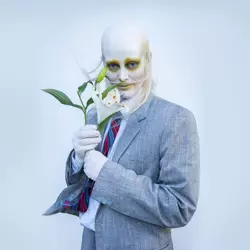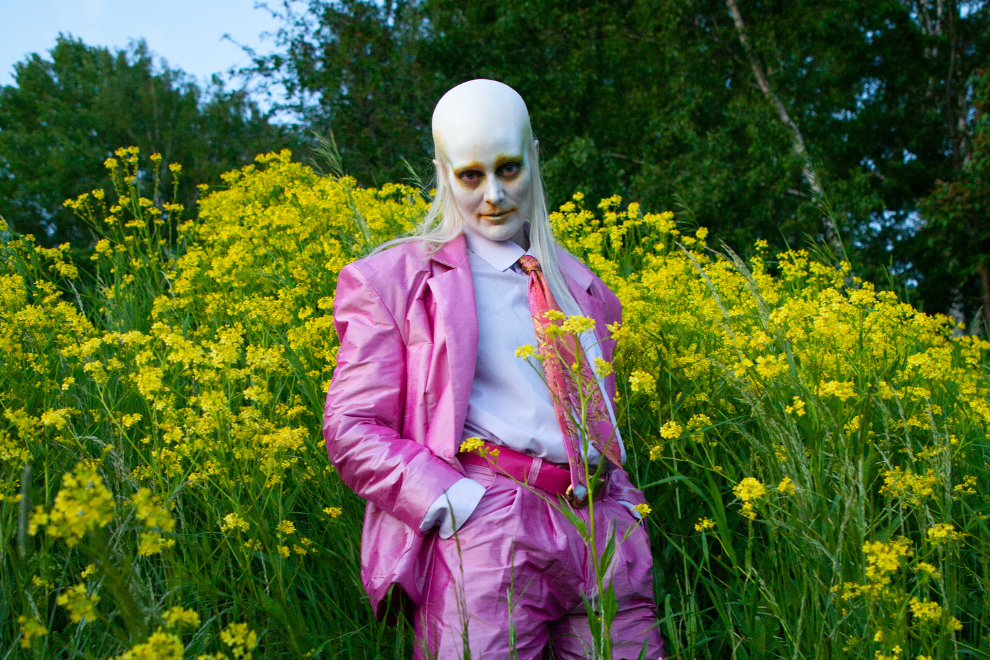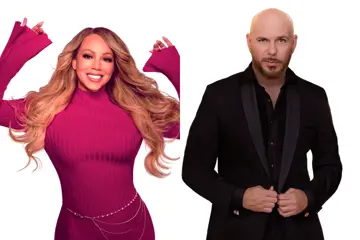 Fever Ray
Fever RayFever Ray, aka Karin Dreijer, may be slowly shedding their fabled mystique.
As half of the cult Swedish electro-pop combo The Knife, Dreijer rarely granted interviews. The Knife donned Venetian masks, defying the entertainment industry's commodification of the self as much as shielding their privacy. And solo, Dreijer has developed that subversive theatricality with their Fever Ray character. The elusive musician portrays kooky characters, latterly utilising carnivalesque face paint, prosthetics and costumes.
But on releasing the art-pop opus Radical Romantics in 2023, Dreijer has courted the media – and opened up. They attribute this change to a new clarity. "I think from experience and being older and also understanding the role of an artist more, I'm more confident," Dreijer states. "It doesn't have to become private. It can be conversations about life and the things that I've been writing about for the last album, which is human relationships – which I find very interesting. So I'm more confident in knowing that I can talk about these things.
"Of course, it's a power imbalance from the start – because most often it is called an 'interview' and it will be me, my name or what I do headlining something. But I still think it can be good conversations."
It transpires that Dreijer is curious about others' lives, too. "I like to read interesting interviews with some of the artists that I listen to," they say. "Me personally, I'm always interested in 'How do artists do it?'" Dreijer chortles. "I mean, it's a very practical angle, but that's just something that I struggle with. 'How do you actually live like this? How do you keep relationships? How do you bring up children, if you do that? How do you maintain relationships while travelling?'"
Dreijer is Zooming from Stockholm ahead of their inaugural visit to Australia – Fever Ray will be a marquee act at both Vivid LIVE and RISING 2024. Coincidentally, this writer interviewed them back in 2009 over the phone – though reserved, Dreijer came across as warm and whimsical.
Today, a fresh-faced Dreijer – unrecognisable without the special effects make-up and bald cap – is even chattier, apologising for going on Google Meet and relating to the journalist's inability to calculate time differences. They laugh off any advice about preparing for the Antipodean winter. "I've had a look – it looks like Swedish summer." Still, Dreijer reveals a certain shyness, frequently pausing to contemplate their answers. At one stage they break off to close a window, explaining, "I have a truck outside."
In fact, Dreijer has largely been on the road for one-and-a-half years now. Ask whether Dreijer encounters homesickness and they demur: "I've realised it's not so much about a geographical place because sometimes when my friends and my kids come on tour, or we meet up somewhere, that's really nice."
Hailing from Gothenburg, on Sweden's West Coast, Dreijer was playing guitar as a tween. Later, they fronted the indie-rock band Honey Is Cool, relishing an unlikely hit with a country-flavoured rendition of Rod Stewart's ‘80s hit Baby Jane. Nevertheless, performing alongside male instrumentalists was educative, Dreijer confronted by pervasive chauvinism. They’ve since strived to tour with female and non-binary band members and crew.
In the meantime, Dreijer transplanted to Stockholm, launching an altogether more transgressive entity in The Knife with their younger brother Olof. Embracing subcultural electronica, the siblings soon joined a long line of anonymous creatives like Underground Resistance concealing their identities. Dreijer's voice was pitch-shifted.
The Knife disseminated political concept albums, referencing intersectionality and historical materialism. The duo debuted with 2001's eponymous LP on their own label, Rabid Records. They subsequently generated international buzz with the follow-up, Deep Cuts, before unleashing their classic Silent Shout – #1 on Pitchfork's Top 50 Albums Of 2016. At least initially, The Knife limited conventional promotion and, until Silent Shout, declined to perform live. Plus the social activists boycotted Swedish awards ceremonies over gender inequality.
The Knife didn't eschew all exposure. The Argentinian-Swedish indie-folkie José González covered their signature song Heartbeats and licensed it to a Sony BRAVIA TV ad. Cooler, The Knife inspired Robyn's reinvention as a rebellious synth-popster, significantly producing her feminist bop Who's That Girl? ("I know then, when we recorded [that], she was still at some major label," Dreijer shared in 2009. "She had a lot of problems, I remember. Olof and I talked about all the possibilities and how great it was not to be signed to any label. I guess we talked her into it, in a way.")
When in 2009 Dreijer introduced Fever Ray as a solo vehicle with a self-titled LP, it was intended to be a one-off, with The Knife on hiatus and Olof relocating to Berlin to DJ. The singer/songwriter would explore their experiences of parenthood, having married a cishet man and having two children. "I wanted to find out what my own ideas were about making music," they said. "That is something I couldn't have done with somebody else around."
Shrouded in Scandinavian shoegaze aesthetics, Fever Ray's domestic intimacy belied a creeping awareness of isolation, anxiety and dread, Dreijer oppressed by heteronormative dictates – the patriarchy entrenched even in progressive Sweden. They rejected external pressure to retire on I'm Not Done – and the vocalist toured solidly, their show as uncanny as the album with its use of dry ice.
The Knife reunited for a final outing in 2013's experimental and doctrinal Shaking The Habitual – dissolving months after playing an especially festive set at Coachella.
Some eight years on from Fever Ray, Dreijer resurfaced, unannounced, with Plunge. Now divorced, the auteur told The Guardian that they identified as "a queer person" and "gender-fluid". And, on the epiphanic Plunge, Dreijer celebrated desire and rapture over clubby techno beats. (In the kinky single To The Moon And Back, they sing, "I want to run my fingers up your pussy.")
Early last year Dreijer returned with a third Fever Ray LP, Radical Romantics – a rumination on love and idealism, influenced by bell hooks' 2000 tome All About Love: New Visions. Radical Romantics amplifies genderqueer expression. The album is at once philosophical, melancholy and amorous – see: the imploring prologue What They Call Us.
"I was very much trying to figure out mostly what I need in relationships, which is a lot – I guess the same for a lot of people – because you need to get to know yourself and to find out what it is that you need to feel that you are loved and also be able to verbalise this and to ask for it and be that vulnerable," Dreijer reflects.
Aptly, Radical Romantics is Fever Ray's boldest album collaboratively. Dreijer reached out to Olof to complete several songs – the pair last memorably participating in 2019's joint remix project Country Creatures with Björk (home to Fever Ray's alt-banger, This Country Makes It Hard To Fuck).
More astonishingly, Dreijer connected with Nine Inch Nails stalwarts, and now Oscar-winning soundtrack composers, Trent Reznor and Atticus Ross – the Swede admired their score for HBO's superhero drama Watchmen. The Americans bring an industrial edge to Even It Out, a comically cathartic track in which Dreijer plots revenge on their child's bully.
Alas, because Dreijer recorded Radical Romantics amid the pandemic, their exchanges with Reznor and Ross occurred remotely. "The only person I met during the making [of the album] was my brother, because we have studios next to each other now,” they note. However, sending files back and forth, Dreijer enjoyed the element of surprise that ensured: "I like to listen to things when [people] have been working on stuff by themselves and I haven't been involved and my thinking is not there – I think that is very fun."
Radical Romantics has taken on another dimension live, with Dreijer liaising with their creative director (and "best friend”) Martin Falck for a gothic cabaret. "Almost a year before we started touring, I started to work with a Finnish musician called minna koivisto, and we were just listening through the album I had made," Dreijer recollects. "I always try to do some kind of dramaturgy of the show. I know sort of how long it's gonna be – I mean, it can't be too long because I will get too tired. [But], yeah, [we were] just listening to things and sounds and finding out what kind of soundscape we wanted to happen." They had the notion of beginning the spectacle with an a cappella – "something very quiet." Dreijer then rehearsed with the band and brought in choreographer Agnieszka Dlugoszewska.
Dreijer has previously described Fever Ray as a character, if not an alter-ego. Do they still perceive it that way? "No, I think maybe it's more of a filter – like something that I can filter stuff through and get it out. So it's not as schizophrenic as it's been in the past. I think it's definitely a part of me now – and it's something that I can use to make music and talk about things and write about things. It's the beauty with art and fiction; that you have these possibilities to tell stories and to suggest different ways of looking at things."
Has coming out been liberating artistically as well as personally? "Yes, I think that [my music] is more open. I know much more about feelings nowadays – and how to feel feelings. And, of course, getting to know yourself is a big part of being able to be open. You need to know, I wouldn't say who you are – because I think for me it's very fluid and you are always in a process and you're always in a continuation of something. It's always moving – everything. But to understand that as well gives you a lot of freedom."
Regarding their journey, Dreijer is reminded of when The Knife composed music for the Danish Hotel Pro Forma's "electro-opera" Tomorrow, In A Year, adapting Charles Darwin's 1859 work On The Origin Of Species – admitting that the Englishman's theories about natural selection might seem “a very strange comparison”.
"I remember something that I still am thinking about a lot is the idea of that evolution,” Dreijer says. “The 'survival of the fittest' is not about who's the best or the strongest; it's the one who can read the space and find a way through things. Also the process is always ongoing. It never ends and it never stops – and you are never stuck, actually. That was a very liberating thing for me to just understand that perspective. You can feel you're stuck absolutely. But maybe some moments later you can feel something else – which is amazing."
That fluidity, and freedom, extends to Dreijer's unusual status in contemporary music. In 2024 they are simultaneously a pop and avant-garde artist. In addition to writing for theatre, Dreijer has contributed songs to films, notably 2011's Red Riding Hood – Twilight director Catherine Hardwicke's fractured fairytale. If I Had A Heart, the lead single off Fever Ray, was synced as the theme to Vikings.
"I'm super happy and grateful about being able to do different kinds of work within music," Dreijer considers. For them, 'pop' is relative globally. "I think I do pop music, but I also understand I'm not 'pop' in the sense of like 'Taylor Swift pop' and my music is not played on the radio as pop in most countries."
Dreijer remains ambivalent about celebrity, and wary of potential intrusion. "There's this whole other side of pop artists – like you're being famous and being very open with your private life and everything – and I wouldn't want that. I think that must be very difficult."
That Dreijer has again collaborated with Olof raises the prospect that the two will revive The Knife – unless that chapter has concluded? "I actually don't know," Dreijer responds. "I guess it's not closed. We're just doing other things at the moment."
Indeed, Dreijer will fulfil the Radical Romantics tour cycle in September. In the past, they've disappeared for protracted periods between projects. Yet, ever-questioning, Dreijer doesn't necessarily resume a mundane life. "I always think about music. When I'm not touring, I am in the studio. But it's not always like, 'Oh, I'm gonna make an album now and be super productive.' It can be research; trying out new instruments, new sounds, and digging into something – a sound or world – that I just want to explore."
At any rate, Dreijer is unsure what is next. "I don't know," they laugh. "I know it's good to have plans so you don't just fall into a hole or some sort of silence. But I think I will be in my studio and start to try out things.”






